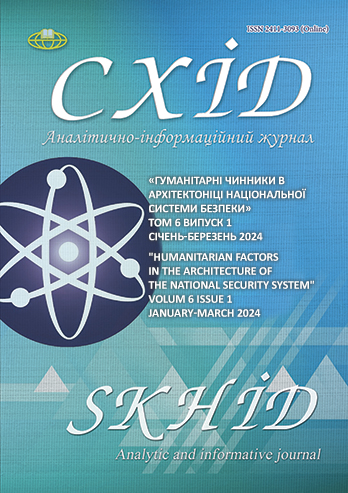Reactualising the problem of social engineering and digital security
DOI:
https://doi.org/10.21847/2411-3093.2024.611Keywords:
artificial intelligence, liminality, social engineering, digital security, social construction, virtual realityAbstract
The article explores the current aspects of social engineering in the digital age. Social engineering is considered as a strategic technology of constructing new meanings, principles, rules and facts of social interaction. The socio-philosophical concepts of K. Popper, P. Sorokin, and R. Silverstone are analyzed in the context of constructive proposals of social engineering. The application of historical and philosophical intellectual constructs to the practices of social transformations is described in the article. The article reveals the possibilities and limitations of digital technologies in social engineering. The risks of creating new tools and algorithms for manipulation, disorientation of users of virtual technologies by social engineering methods are shown within the framework of the digital security problem. The diversity of views on the essence of social engineering and the analysis of its spheres of application problematize the interpretation of its social role and meaning. The methods of constructing social events and interfering in people's lives require critical evaluation. The implementation of AI in social engineering developments leads to the new risks, which are systematized in the article. They are related to the manipulation of public consciousness, distortion of identification and personalisation methods, financial fraud, and violation of human security.
Downloads
References
Arqoub, Omar Ahmad Abu, Özad, Bahire Efe, Elega, Adeola Abdulateef (2019). The Engineering of Consent: A State-of-the-Art Review. Public Relations Review, 45(5). https://doi.org/10.1016/j.pubrev.2019.-101830.
Cialdini, Robert B. (2021). Influence, New and Expanded: The Psychology of Persuasion. Harper Business. 592 р.
Gehl, Robert & Lawson. Sean.(2022, Jun, 29). Masters of Crowds: The Rise of Mass Social Engineering. The MIT Press. Posted on, 2022. https://thereader.mitpress.mit.edu/masters-of-crowds-the-rise-of-mass-social-engineering/
Haddon, L. (2011). Domestication Analysis, Objects of Study, and the Centrality of Technologies in Everyday Life. Canadian Journal of Communication. 36, 311-323. https://doi.org/10.22230/cjc.2011v36n2a2322
Kalniņš, R., Puriņš, J., Alksnis, G. (2017). Security Evaluation of Wireless Network Access Points. Applied Computer Systems, 21, 38–45. https://doi.org/10.1515/acss-2017-0005
Kirby, A. (2009). Digimodernism: How New Technologies Dismantle the Postmodern and Reconfigure Our Culture. Continuum. 288 р.
Kolinko, M. (2018). Мetodolohichnyy potentsial kontseptsiyi domestykatsiyi. Skhid, 5 (157), 47-51 https://doi.org/10.21847/1728-9343.2018.5(157).148996 (In Ukrainian).
Kolinko, M. (2019). Mizhkulturna komunikatsiya: topolohichnyy vymir. Vinnytsya, TVORY Ltd. (In Ukrainian).
Kolinko, M. (2023). P'yatnadtsyatykhvylynne misto»: politsentrychna struktura suchasnoho mehapolisu. Kyyivsʹki filosofsʹki studiyi-2023: Conference Papers. Kyiv, Borys Grinchenko Kyiv University, pp. 39-43. https://fshn.kubg.edu.ua-/images/stories/Departaments/kaf_f/KFS-2023/%D0%B7%D0%B1%D1-%96%D1%80%D0%BA%D0%B0_%D0%9A%D0%A4%D0%A1-23.pdf (In Ukrainian).
Kolinko, M., Petryshyn, H. (2022). Simulacra and fakes in the information warfare. Skhid, 3 (3), 9-14 https://doi.org/10.21847/1728-9343.2022.3(3).266049 (In Ukrainian).
The Role of AI in Social Engineering. (2023, November, 8). Website "zveloLIVE". URL: https://zvelo.com/the-role-of-ai-in-social-engineering/.
Salahdine, F., Kaabouch, N. (2019). Social Engineering Attacks: A Survey. Future Internet, 11 (89), 1-17. https://doi.org/10.3390/fi11040089.
Shirodkar, N. (2023, November, 26). "Social engineering" experiments in full swing in Bihar in run-up to 2024. PUNE.NEWS. https://pune.news/nation/social-engineering-experiments-in-full-swing-in-bihar-in-run-up-to-2024-94072/.
Turner, S. (2022). Digital affordances and the liminal. In «The Technologisation of the Social A Political Anthropology of the Digital Machine». Р. 98-111. https://doi.org/10.4324/9781003052678-6
Downloads
Published
How to Cite
Issue
Section
License
Copyright (c) 2024 Марина Колінько

This work is licensed under a Creative Commons Attribution-NonCommercial-NoDerivatives 4.0 International License.
1. Authors bear responsibility for the accuracy of facts, quotations, numbers and names used.
2. Manuscripts are not sent back.
3. The publisher does not always agree with the authors' opinion.
4. The authors reserve the right to authorship of the work and pass the first publication right of this work to the journal under the terms of a Creative Commons Attribution-NonCommercial-NoDerivatives 4.0 International License. This license allows others to distribute (copy) the published work for non-commercial purposes, provided there is mandatory attribution to its authors and a link to the first publication in our journal.
5. The authors have the right to conclude separate supplement agreements that relate to non-exclusive work distribution in the form in which it has been published by the journal (for example, to upload the work to the online storage of the journal or publish it as part of a monograph), provided that the reference to the first publication of the work in this journal is included.

